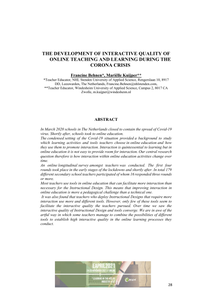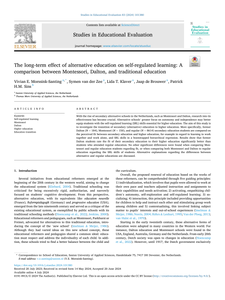Over the past few decades, education systems, especially in higher education, have been redefined. Such reforms inevitably require reconsideration of operational notions and definitions of quality, along with a number of related concepts. This reconsideration aligns with the core of higher education reforms: improving efficacy and compatibility with emerging social demands while adapting to competitiveness and accountability trends. As primary players in the teaching and learning process, online tutors have a protagonistic role and, therefore, must be equipped with a suitable set of competencies and attributes in addition to content knowledge. This quantitative research aims to analyze the perceptions of 250 online tutors working in European higher education institutions, distributed in 5 knowledge areas: Business, Education, Humanities, Sciences and Health. This descriptive and exploratory nonexperimental study reveals the technological and pedagogical skills and competencies that online tutors consider fundamental for effective online teaching and proposes professional development actions to ensure quality online teaching.
DOCUMENT

The purpose of this paper is to reflect on the experiences of safety and security management students, enrolled in an undergraduate course in the Netherlands, and present quantitative data from an online survey that aimed to explore the factors that have contributed to students’ satisfaction with, and engagement in, online classes during the COVID-19 pandemic. The main findings suggest an interesting paradox of technology, which is worth further exploration in future research. Firstly, students with self perceived higher technological skill levels tend to reject online education more often as they see substantial shortcomings of classes in the way they are administered as compared to the vast available opportunities for real innovation. Secondly, as opposed to democratising education and allowing for custom-made, individualistic education schedules that help less-privileged students, online education can also lead to the displacement of education by income-generating activities altogether. Lastly, as much as technology allowed universities during the COVID-19 pandemic to continue with education, the transition to the environment, which is defined by highly interactive and engaging potential, may in fact be a net contributor to the feelings of social isolation, digital educational inequality and tension around commercialisation in higher education.
MULTIFILE

In March 2020 schools in The Netherlands closed to contain the spread of Covid-19 virus. Shortly after, schools took to online education. The condensed setting of the Covid-19 situation provided a background to study which learning activities and tools teachers choose in online education and how they use them to promote interaction. Interaction is quintessential to learning but in online education it is not easy to provide room for interaction. Our central research question therefore is how interaction within online education activities change over time. An online longitudinal survey amongst teachers was conducted. The first four rounds took place in the early stages of the lockdowns and shortly after. In total 179 different secondary school teachers participated of whom 16 responded three rounds or more. Most teachers use tools in online education that can facilitate more interaction than necessary for the Instructional Design. This means that improving interaction in online education is more a pedagogical challenge than a technical one. It was also found that teachers who deploy Instructional Designs that require more interaction use more and different tools. However, only few of these tools seem to facilitate the interactive quality the teachers pursued. Over time we saw the interactive quality of Instructional Design and tools converge. We are in awe of the artful way in which some teachers manage to combine the possibilities of different tools to establish high interactive quality in the online learning processes they conduct.
DOCUMENT

Morssink-Santing, V. E., van der Zee, S., Klaver, L. T., de Brouwer, J., andamp; Sins, P. H. (2024). The long-term effect of alternative education on self-regulated learning: A comparison between Montessori, Dalton, and traditional education. Studies in Educational Evaluation, 83, 101380. https://doi.org/10.1016/j.stueduc.2024.101380
MULTIFILE

Dit Trendrapport Open Education 2014 beschrijft de trends op het gebied van open education in binnen- en buitenland, geschreven vanuit de context van het Nederlandse hoger onderwijs. Dat gebeurt aan de hand van acht artikelen van Nederlandse experts op het gebied van open en online onderwijs en acht korte intermezzo’s.
DOCUMENT

The Spring of 2020 brought many disruptions to our professional and personal lives due to the COVID-19 pandemic that forced worldwide mid-semester campus closures; pivoting of traditional, face-to-face classes to remote teaching and learning; and postponements or cancellations of conferences, workshops, and other professional development events. One example of the breakdown of scheduled opportunities for us as honors colleagues to gather in-person to enhance our practices and strengthen our community was the cancellation of the 2020 International Conference on Talent Development and Honors Education in Groningen, the Netherlands, originally slated for June 10-12 but moved to June 16-18, 2021. Immediately following the 2020 conference, we (the authors) had planned to offer the fifth Honors International Faculty Institute (HIFI), an international and highly interactive occasion for honors and talent development teachers, researchers, and leaders to engage in presentations, experiential activities, place-as-text explorations, collaborative group work, reflective exercises, and showcases designed to improve teaching, learning, and programming in honors. Suddenly, the coronavirus upended our world, and we had to reimagine the institute that we had previously organized four times alternately at Hanze University of Applied Sciences (Netherlands) and Texas Christian University (USA). Putting aside the disappointment of the moment and recognizing the value of coming up with an alternative to HIFI that would ensure the safety and health of our honors colleagues, we decided to create a fully online version with free registration to encourage participation and create resources accessible to all members of our international community. We wanted to highlight the challenges of how all of us unexpectedly had to pivot to remote teaching and learning as the global pandemic intensified, but we also wanted to share information, experiences, and models that could open new avenues for operationalizing online honors education more generally beyond the COVID-19 crisis. We wanted, in other words, to explore how honors pedagogy could (and maybe should) be adapted to the increasingly online world of primary, secondary, and higher education. Thus, HIFLO 2020 was born! HIFLO stands for Honours International Faculty Learning Online.
DOCUMENT
Due to the Covid-19 crisis, higher education was forced to offer online alternatives to their courses. This change drastically increased the number of students partaking in online education. However, the effects of obligatory online education could potentially be harmful and are not yet sufficiently explored. This research analyses the impact of obligatory online education on business students’ social life, well-being and academic performance. The study used a phenomenological and a comparative approach to assess and compare students’ personal experiences in Germany and the Netherlands. A total number of 30 semi-structured interviews were conducted with students in the mentioned countries. Results show, that students’ academic performance decreased due to a lack of student identity, study life balance, motivation and technological issues during e-learning. Furthermore, mixed findings were recorded about the impact on social life. Finally, a slight drop in students’ well-being caused by a decline in physical and mental health was observed. Findings of this study are significant in a sense that they can provide crucial information for policymakers, educators and managers in higher education which enable them to make more informed decisions when delivering online education in crucial times and enhance students’ experience. This will consequently create a more positive impact for students’ well-being, social life and academic performance.
DOCUMENT

Development of an online education program for students sports studies on e-health to optimise lifestyle coaching
DOCUMENT

Dit document is geschreven voor docenten die stagiairs begeleiden en ter ondersteuning daarvan de Stage-App gaan gebruiken. Het doel is om praktische tips en inzichten te geven voor het (deels) online begeleiden van stagiairs. Deze handreiking bestaat uit drie onderdelen: 1) Wat is bekend over goede (online) stagebegeleiding? 2) Hoe werkt de Stage-App? 3) Hoe gebruik je de Stage-App in het stagebegeleidingsproces? Dit rapport hoort bij https://www.hu.nl/onderzoek/projecten/online-stagebegeleiding
DOCUMENT

Blended learning, a teaching format in which face-to-face and online learning is integrated, nowadays is an important development in education. Little is known, however, about its affordances for teacher education, and for domain specific didactical courses in particular. To investigate this topic, we carried out a design research project in which teacher educators engaged in a co-design process of developing and field-testing open online learning units for mathematics and science didactics. The preliminary results concern descriptions of the work processes by the design teams, of design heuristics, and of typical ways of collaborating. These findings are illustrated for the case of two of the designed online units on statistics didactics and mathematical thinking, respectively.
LINK